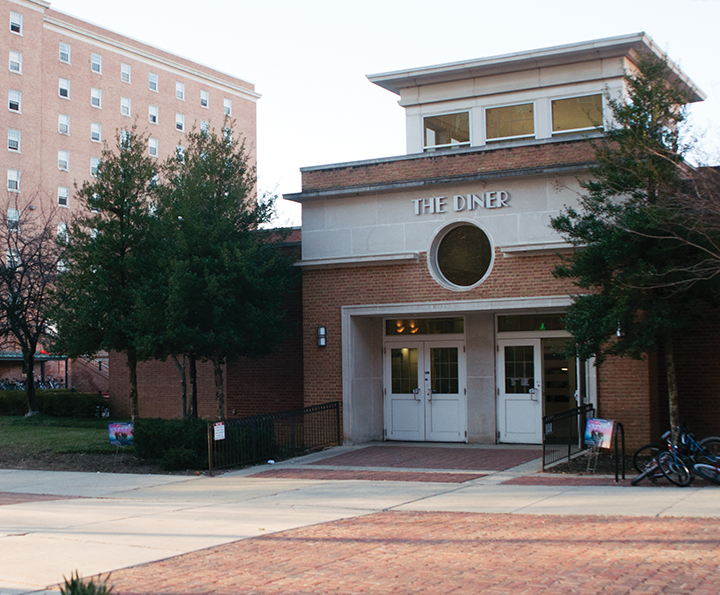Dining Services has secured an agreement with a biometric company for hand scanners, announced earlier openings and proposed expanded vegan options for the fall, when the University of Maryland will switch to an anytime dining system.
The new system will switch out dining points, Terp Bucks and carryout for unlimited access to the dining halls for students with a meal plan and will take effect at the beginning of next semester, putting this campus in line with the majority of dining programs at Big Ten universities, Dining Services spokesman Bart Hipple said.
The change is a result of low satisfaction ratings and the common occurrence of students running out of dining points, he said.
Dining Services reached an agreement with a company called Wave Systems Corp. for the biometric hand scanners that will grant customers entry into the dining halls, Hipple said.
The scanners will measure four points on a person’s palm and turn the points into a hexadecimal number, he said. A student will have to wave their hand in order to open entrance gates that Dining Services will install in the dining halls. The information that the scanners store is not useful outside the system.
“They use this in federal buildings and high-access security buildings,” he said, “but they’re not using it in universities that we’re aware of.”
Dining Services will install two hand-scanning kiosks in 251 North, three in the South Campus Dining Hall and four in the North Campus Dining Hall.
In the fall, 251 North will be open from Sunday through Friday from 11:30 a.m. to 9 p.m. The dining halls will open at 7 a.m. on weekdays instead of 7:30 a.m.
“That’s a response to the understanding that students have 8 o’clock classes,” Hipple said. “Before, you could pop in and get a cup of coffee and a bagel sandwich and walk out, and now we’re going to expect you to eat in.”
Dining Services will also be adding more vegan options in 251 North and the South Campus Dining Hall. The former 251 Express, which closed in fall 2014, will become 251 Vegan. Jalapeno Grill in the South Campus Dining Hall will also become a vegan station, similar to Sprouts in the North Campus Dining Hall, Hipple said.
Dining Services also plans to move several dining hall stations into the dining area, including a beverage bar, the coffee station, the cereal bar and the bagel area. These stations will line the perimeter of the dining room, which Dining Services will accommodate by shortening the area that currently holds the tray return belt, Hipple said.
The tray return belt will not be necessary, he said, because the dining halls will discontinue the use of trays. Instead, they will install a rotating dish collector similar to the one in 251 North.
In the South Campus Dining Hall, one side of the popular stir-fry station will feature pre-cooked items similar to those of Panda Express, Hipple said.
“We are aware that if we are going to tell students, and we are, that you need to eat inside, we have to have food that’s very, very quick for them to eat,” he said.
Portion sizes will also change for meals to reflect students’ desire for more varied meals.
“Realistically, you don’t need or want a whole quesadilla, you just want a little bit and then a little bit of something else,” Hipple said. “We’ll be adjusting our menus so that we can do that.”
Over the summer, employees will install new equipment in both of the dining halls, including heating units above and below grills to keep food hot without drying it out. Hipple said this equipment will help create higher quality food.
Dining Services will also place a quiet room in both dining halls and bring more TVs to the media room in the North Campus Dining Hall, Hipple said.
Freshman Meghan Bowman said she is upset that carryout options won’t be available.
“The only thing I don’t like is that you can’t take to-go food out, and I know sometimes when I’m busy or in a rush on my way to class, I have to get it to go,” the animal sciences major said.
Freshman computer science major Jake Chavis said he is looking forward to the new dining plan because he ran out of dining points last semester.
“I remember last semester I would have to eat one meal a day toward the end because I didn’t have enough points to get three meals a day,” he said. “Whereas with this I don’t really have to worry about when I’m eating.”
Hipple said he has been attending Residence Hall Association meetings to discuss the new dining program and address concerns.
“There are issues that we have not resolved yet,” he said. “There are problems students will have with this plan that don’t know what the answer is, and we’ll do our best to help, but we may not be able to resolve all the questions and make everyone happy.”



